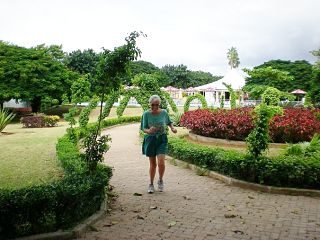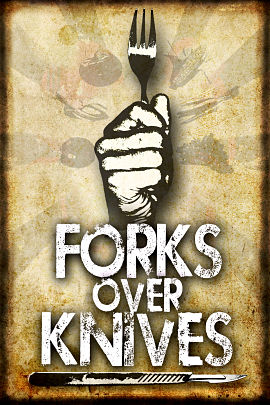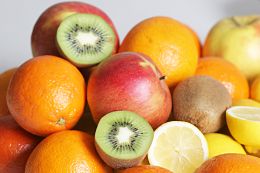Ruth Heidrich Shares Her Success in Forks Over Knives And Everywhere Someone Can Benefit
I was fortunate to have the opportunity to interview Ruth Heidrich, Ph.D., one of the star patients in the movie Forks Over Knives. Ruth provides insights into the making of the film and her ongoing work to educate others on the power of a whole foods, plant-based diet. If you have not seen this film yet, grab the first opportunity to experience it. You will see Ruth and several other patients revitalizing their health through diet, not drugs. In this dialogue, Ruth is RH, and I am JS.
JS: For those who are not familiar with your story, it would be great to have a short overview of your diagnosis of metastatic breast cancer and subsequent cancer-free life. I always think of you as the woman who beat cancer into submission with broccoli and oatmeal.
RH: Sitting in the doctor’s office awaiting the results of a breast biopsy, I was positive that this was going to be just a little blip in the road of life, that there was no way it could be cancer. I was a runner for 14 years, had even run marathons, and ate what I thought was a good diet, you know, chicken and fish, low-fat dairy, all the “good proteins.” I was the healthiest, fittest person I knew, in fact.
So when the diagnosis came back with metastatic cancer, I was shocked, stunned, and devastated! Then the denial set in. There must have been some mistake, so I got a second opinion, but same cancerous result. A third, fourth, and even a fifth, were no different — I was now a cancer patient.
Then there was a gigantic stroke of luck that turned out to save my life! John McDougall, MD, was starting a clinical research study to demonstrate that breast cancer could be reversed with a low-fat vegan diet. I immediately enrolled in the study because the choice of chemo/radiation versus changing my diet was clear — and a no-brainer for me.
At the same time, I happened to see the Ironman Triathlon on TV and thought, hey, I can do that! I knew I had the 26.2 mile
marathon handled, so all I had to do was throw in a 2.4 mile swim and a 112 mile bike. Then I found out that no cancer patient had ever completed the Ironman, and no woman as old as I, 47 at the time, had ever done it. With my new diet, I felt stronger, faster, and was convinced that this new way of eating could not only reverse cancer, but when my high cholesterol dropped as well, I wanted to show people that this is the way all humans should eat. All this was nearly 30 years ago, and I’m convinced to this day that our lifestyle choices make the difference between thriving and dying.
JS: You have shared your story in many ways, including your book A Race for Life. What is it like for you sharing such a deeply personal story with the world?
RH: Back in the early 80s, very little was known about all of this. I felt like a real pioneer as I became the first vegan I knew and the first Ironman triathlete I knew. Because of all the benefits, both physical and, very importantly, the psychological, I wanted to tell the world what I was discovering. As it turns out, I guess I can’t help but share this story because of the immense gains to the health status of most of those sedentary people consuming the standard Western diet.
- The film Forks Over Knives dramatically shows how breast cancer, diabetes, and heart disease can be reversed by real patients
JS: How did you become part of the film Forks Over Knives?
RH: I received an email one day, asking if I would be willing to have a camera crew come out and film me for a documentary that was being produced. This, obviously, would fit very well into the plan to help spread the word.
JS: What has it been like for you being part of this film? What are the highlights for you?
RH: Being part of the film was a great deal of fun. I got to show the film crew some of my favorite places to run, which included a heavily-wooded urban forest and a promenade along a beach in White Rock, BC, Canada. I also got to show off my home gym, my little organic garden patch, and how I throw together my rather large meal of raw fruit and veggies in less than 10 minutes! I also gave the crew copies of, not only my first book, but also Senior Fitness, which was about much more than just cancer.
JS: Some people on a standard American/Canadian diet, based on animal and processed foods, will go to see Forks Over Knives and be inspired to change their diets. But they may have no idea where to start or what to have for breakfast the next day. What advice would you give them to successfully launch a new eating plan?
RH: Well, I know it can be a challenge because I remember well going through those first few vegan days myself. I already loved oatmeal and when Dr. McDougall suggested apple juice instead of dairy, I thought that sounded pretty good.
For the other meals, substitution is the name of the game. For example, for spaghetti sauce, use little broccoli “trees” and nobody misses the meat. For most casserole dishes, the flavor is in the veggies and starches, so most people wouldn’t miss the meat there, either. Salads just need to be enlarged and with kale, spinach, or organic baby greens with balsamic vinegar as your dressing, you can make a whole meal out of just that.
And who can resist the allure of blueberries, apples, mangoes, bananas, kiwi, and probably any other fruit you can name. I know
some might like a little “hand-holding” and that’s where CHEF comes in, my ebook that explains the theory behind eating this way, how to stock your larder, and recipes that are (C)heap, (H)ealthy, (E)asy, and (F)at-free.
JS: What are your favorite foods?
RH: I can sum it up quite simply — all plants! I guess I do enjoy fruit the most, though.
JS: Do you have any plans for future movies, books, or other big projects? Ideally, how would you like to continue spreading the word?
RH: Forks Over Knives is getting a lot of attention, but I’d love to do more. As for my next book, I’m collecting photos of running in the most exotic places in the world, for a book to be entitled “Running ‘Round The World” to show people how much fun running can be.

Ruth enjoys running in Mozambique. She wants to get others off the couch and out racing in nice settings.
Some of the highlights I’ve gotten so far are running in front of Komodo dragons, the Great Wall of China, the Sidney Harbour Bridge, with Zulu tribesmen in South Africa, St. Helena island (the one made famous by Napoleon), the Seychelles in the Indian Ocean, running up one of the largest sand dunes in the world in Namibia, Angkor Wat in Cambodia, and one of the scariest, running in Oman, a Muslim country where there were few runners, and much less women runners.
People don’t need to be sick, don’t need to be overweight, and can eat the most delicious foods in the world! We just need to get to them and that’s what I’m working on! And, if I might, I’d love people to check out my website, www.RuthHeidrich.com because it’s got lots of information, pictures, and even an “Ask Dr. Ruth” column, which is a lot of fun, too! So I do appreciate this opportunity you’ve given me and thank you very much!
If you enjoyed this interview with Ruth, you may want to read more about San’Dera Prude, another Forks Over Knives reality star. In this post, San’Dera shares how she became part of the film and her wonderful success.
Intrigued? Now you can use our Whole Foods Blog Finder to target informative, fun postings on plant-based nutrition. Quick information at no cost!
Blog posting by Janice Stanger, Ph.D. Janice authored The Perfect Formula Diet: How to Lose Weight and Get Healthy Now With Six Kinds of Whole Foods. This easy-to-follow eating plan is built on sustainable food choices that can prevent, and even reverse, most chronic disease.
Tags: breast cancer, Dr. John McDougall, Dr. Ruth Heidrich, Forks Over Knives, getting healthy, ironman, Janice Stanger, making a difference now, whole foods, whole foods plant-based diet









Studies in Montreal Canada have positively linked cancer to pollution. The methodology was to plot cancer patients locations with pollution levels. Diet may be important but it is naieve to believe that it is the main factor in preventing or curing cancers. Fruit is a wonderful food but our society depends on using large amounts of energy to grow and transport it. Eating local grown can be just as healthy and much more environmentaly sustainable. Travelling around the world to create a book about running is just irresponsible, the fuel used is destroying the planet and it encourages others to ape this behavior.
The segment in the film “Forks over Knives” featuring featuring Ruth was the most memorable of the whole movie. Because she lives in my city and because she is doing this at her age – which gives me hope for a long life too. Even more memorable was the shot of her running while a couple of seniors, one with cane, were sitting on a park bench. That was so profound. All three people were making their choices and I knew which one was enjoying her life more. Thanks for the inspiration, Ruth.